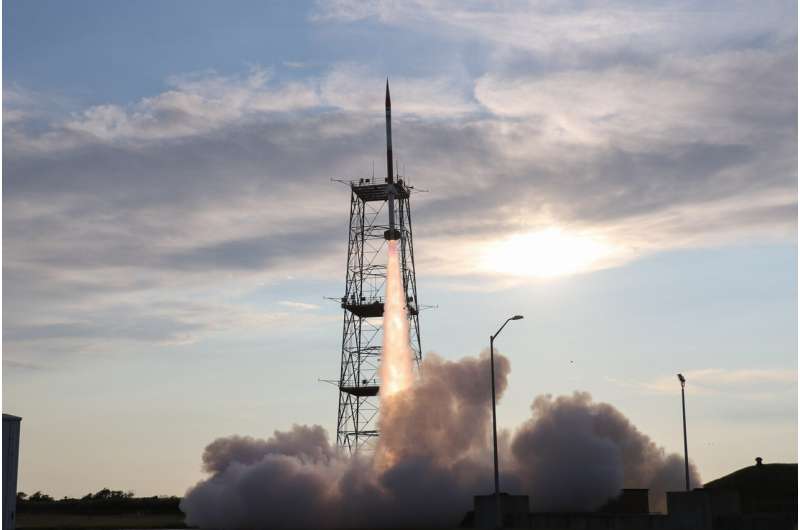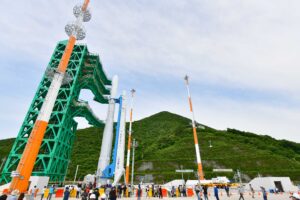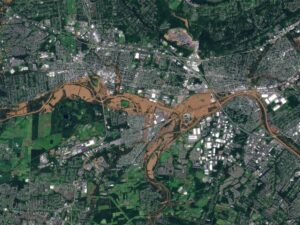Image: Energy Department mission launched from Wallops
Tuesday, 14 September 2021 12:56
A two-stage suborbital sounding rocket launched at 6:07 p.m. EDT for the Department of Energy's National Nuclear Security Administration from NASA's launch range at Wallops Flight Facility on the Eastern Shore of Virginia.
The Terrier-Improved Malemute rocket flew the payload to an altitude of 99 miles. The payload descended by parachute and landed in the Atlantic Ocean, 59 miles from Wallops Island. The payload was recovered and preliminary indications are that good data was received.
The flight is part of the HOTShot program, short for High Operational Tempo, which collects scientific data that benefits aerospace research and informs future weapon designs for the U.S. nuclear enterprise. Its non-nuclear scientific experiments evaluate prototypes and help develop high-fidelity computer models and mechanical flight simulators.
The next rocket launch from Wallops is targeted for no earlier than October 2021.
Explore further
South Korea seeks $553 million space budget for 2022
Tuesday, 14 September 2021 12:33
In a bid to nurture its nascent domestic space sector, South Korea is seeking a 640 billion won ($553 million) annual space budget for 2022. If granted in full, it would amount to a 4 percent increase from this year’s 615 billion won.
Two astronauts return to ISS after 7-Hour Spacewalk
Tuesday, 14 September 2021 11:33 Two international astronauts, Japan's Akihiko Hoshide and France's Thomas Pesquet have returned safely to the International Space Station (ISS) after completing a spacewalk that spanned nearly seven hours, NASA said.
"Astronauts Akihiko Hoshide of the Japan Aerospace Exploration Agency (JAXA) and Thomas Pesquet of ESA (European Space Agency) have concluded the first spacewalk conducted by
Two international astronauts, Japan's Akihiko Hoshide and France's Thomas Pesquet have returned safely to the International Space Station (ISS) after completing a spacewalk that spanned nearly seven hours, NASA said.
"Astronauts Akihiko Hoshide of the Japan Aerospace Exploration Agency (JAXA) and Thomas Pesquet of ESA (European Space Agency) have concluded the first spacewalk conducted by Space Babes
Tuesday, 14 September 2021 11:33 Houston, we have a problem! Love and sex need to happen in space if we hope to travel long distances and become an interplanetary species, but space organizations are not ready.
National agencies and private space companies - such as NASA and SpaceX - aim to colonize Mars and send humans into space for long-term missions, but they have yet to address the intimate and sexual needs of astron
Houston, we have a problem! Love and sex need to happen in space if we hope to travel long distances and become an interplanetary species, but space organizations are not ready.
National agencies and private space companies - such as NASA and SpaceX - aim to colonize Mars and send humans into space for long-term missions, but they have yet to address the intimate and sexual needs of astron New research takes us closer to figuring out supermassive black holes
Tuesday, 14 September 2021 11:33 Galaxies host supermassive black holes, which weigh millions to billions times more than our Sun. When galaxies collide, pairs of supermassive black holes at their centres also lie on the collision course. It may take millions of years before two black holes slam into each other. When the distance between them is small enough, the black hole binary starts to produce ripples in space-time, which
Galaxies host supermassive black holes, which weigh millions to billions times more than our Sun. When galaxies collide, pairs of supermassive black holes at their centres also lie on the collision course. It may take millions of years before two black holes slam into each other. When the distance between them is small enough, the black hole binary starts to produce ripples in space-time, which Quasars as Cosmic Standard Candles
Tuesday, 14 September 2021 11:33 In 1929, Edwin Hubble published observations that galaxies' distances and velocities are correlated, with the distances determined using their Cepheid stars. Harvard astronomer Henrietta Swan Leavitt had discovered that a Cepheid star varies periodically with a period that is related to its intrinsic luminosity. She calibrated the effect, and when Hubble compared those calculated values with his
In 1929, Edwin Hubble published observations that galaxies' distances and velocities are correlated, with the distances determined using their Cepheid stars. Harvard astronomer Henrietta Swan Leavitt had discovered that a Cepheid star varies periodically with a period that is related to its intrinsic luminosity. She calibrated the effect, and when Hubble compared those calculated values with his Rerun of supernova blast expected to appear in 2037
Tuesday, 14 September 2021 11:33 It's challenging to make predictions, especially in astronomy. There are however, a few forecasts astronomers can depend on, such as the timing of upcoming lunar and solar eclipses and the clockwork return of some comets.
Now, looking far beyond the solar system, astronomers have added a solid prediction of an event happening deep in intergalactic space: an image of an exploding star, dubb
It's challenging to make predictions, especially in astronomy. There are however, a few forecasts astronomers can depend on, such as the timing of upcoming lunar and solar eclipses and the clockwork return of some comets.
Now, looking far beyond the solar system, astronomers have added a solid prediction of an event happening deep in intergalactic space: an image of an exploding star, dubb NATO Air and Space Power - Taking the Alliance into 2030
Tuesday, 14 September 2021 11:33 From Sept. 7-9 the Joint Air Power Competence Centre (JAPCC) hosted their annual Conference convening the NATO Airpower community at Essen, Germany. The presentations and discussions were focused on the topic of Delivering NATO Air and Space Power at the speed of relevance.
"The annual JAPCC conference provides an outstanding opportunity to address the significant challenges of bringing po
From Sept. 7-9 the Joint Air Power Competence Centre (JAPCC) hosted their annual Conference convening the NATO Airpower community at Essen, Germany. The presentations and discussions were focused on the topic of Delivering NATO Air and Space Power at the speed of relevance.
"The annual JAPCC conference provides an outstanding opportunity to address the significant challenges of bringing po SpiderOak wins second Air Force contract for secure space communications
Tuesday, 14 September 2021 11:33 The U.S. Air Force has approved an approximately $750,000 Small Business Innovation Research grant to SpiderOak to test its new OrbitSecure secure communications protocol on military satellites and ground stations. The outcome will enable government agencies to leverage commercial space assets for federal missions in emerging hybrid space architectures that mix commercial and government satellit
The U.S. Air Force has approved an approximately $750,000 Small Business Innovation Research grant to SpiderOak to test its new OrbitSecure secure communications protocol on military satellites and ground stations. The outcome will enable government agencies to leverage commercial space assets for federal missions in emerging hybrid space architectures that mix commercial and government satellit US Navy sets up Gulf drone task force amid Iran tensions
Tuesday, 14 September 2021 11:33 The US Navy's Fifth Fleet said Thursday it launched a new task force in the Gulf incorporating drones and artificial intelligence following maritime attacks blamed on Iran.
A statement by the US Naval Forces Central Command, or NAVCENT, said the task force would rely on regional and coalition partnerships.
"The bottom line on why we're doing this is so that we can develop and integrate u
The US Navy's Fifth Fleet said Thursday it launched a new task force in the Gulf incorporating drones and artificial intelligence following maritime attacks blamed on Iran.
A statement by the US Naval Forces Central Command, or NAVCENT, said the task force would rely on regional and coalition partnerships.
"The bottom line on why we're doing this is so that we can develop and integrate u New Navy task force to work on bringing unmanned systems into operations
Tuesday, 14 September 2021 11:33 The U.S. Navy has set up its first-ever task force that'll use a vast ocean area in the Middle East as the setting for learning how to incorporate unmanned systems and artificial intelligence into maritime operations.
Task Force 59 will specifically be focused on the U.S. 5th Fleet area of operations, the Navy said on Thursday.
The fleet was selected for its strategic importance,
The U.S. Navy has set up its first-ever task force that'll use a vast ocean area in the Middle East as the setting for learning how to incorporate unmanned systems and artificial intelligence into maritime operations.
Task Force 59 will specifically be focused on the U.S. 5th Fleet area of operations, the Navy said on Thursday.
The fleet was selected for its strategic importance, AFRL promotes 'one lab, two services' at Space Symposium
Tuesday, 14 September 2021 11:33 Air Force Research Laboratory Commander Maj. Gen. Heather Pringle and other AFRL subject matter experts gathered to connect with the space community at the Space Foundation's 36th National Space Symposium in Colorado Springs August 23-27.
Space Foundation Chief Executive Officer, retired U.S. Navy Rear Admiral Thomas E. Zelibor opened the annual symposium, which was last hosted in April 20
Air Force Research Laboratory Commander Maj. Gen. Heather Pringle and other AFRL subject matter experts gathered to connect with the space community at the Space Foundation's 36th National Space Symposium in Colorado Springs August 23-27.
Space Foundation Chief Executive Officer, retired U.S. Navy Rear Admiral Thomas E. Zelibor opened the annual symposium, which was last hosted in April 20 SPY-7 Hybrid Defense program with Japan completes additional capability tests
Tuesday, 14 September 2021 11:33 On August 26, the Missile Defense Agency (MDA) and U.S. Navy Aegis Technical Representative (TECHREP) witnessed a successful Mid-Release 2 Demonstration of the software release for the Japanese J7.B Aegis Weapon System equipped with SPY-7 radar, in Moorestown, New Jersey. Japan will field J7.B onboard an afloat Aegis System-Equipped Vessel (ASEV) to provide ballistic missile defense (BMD).
On August 26, the Missile Defense Agency (MDA) and U.S. Navy Aegis Technical Representative (TECHREP) witnessed a successful Mid-Release 2 Demonstration of the software release for the Japanese J7.B Aegis Weapon System equipped with SPY-7 radar, in Moorestown, New Jersey. Japan will field J7.B onboard an afloat Aegis System-Equipped Vessel (ASEV) to provide ballistic missile defense (BMD). SpaceX launches Starlink satellites into orbit from West Coast
Tuesday, 14 September 2021 11:33 Elon Musk's SpaceX successfully launched a stack of Starlink satellites into space Monday night, the first such launch since May.
The Falcon 9 rocket lifted off through a cloud of fog on schedule at 8:55 p.m. PDT from Space Launch Complex 4E at the Vandenberg Space Force Base in California, carrying 51 Starlink satellites into space, which were deployed about 30 minutes later.
SpaceX
Elon Musk's SpaceX successfully launched a stack of Starlink satellites into space Monday night, the first such launch since May.
The Falcon 9 rocket lifted off through a cloud of fog on schedule at 8:55 p.m. PDT from Space Launch Complex 4E at the Vandenberg Space Force Base in California, carrying 51 Starlink satellites into space, which were deployed about 30 minutes later.
SpaceX Planet provides data to federal civilian agencies under NASA contract
Tuesday, 14 September 2021 11:00
Researchers delving into climate change, biodiversity loss and other topics through work funded by U.S. federal civilian agencies and the National Science Foundation will have access to Planet Earth-observation data through September 2022, under a NASA contract announced Sept.

